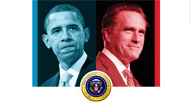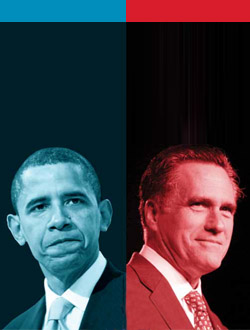“Key question for the next US President…

Mark Stabile
…how to balance US fiscal policy over the next decade. The current tax base simply cannot support even the basic safety net that US citizens have come to expect without drastic and either unrealistic or unspecified cuts to current federal spending. The parties are far apart on how to raise revenues or scale back spending. Details on both sides are few and far between.
The issues underlying these decisions – sustaining Medicare and Social Security, dealing with growing inequality and a shrinking middle class, providing and enhancing health insurance for those who need it, and providing a necessary boost to the still suffering economy – must all be balanced with the need to control the federal deficit and debt. Striking this balance is not simply a campaign issue, but a serious domestic agenda for the decade to come.”
» Mark Stabile is founding Director of the School of Public Policy and Governance and Professor of Economics and Public Policy at the Rotman School of Management, University of Toronto. He is currently a visiting professor at Sciences Po Paris and the London School of Economics.
Mark Fitzpatrick
…whether to launch another war in the Middle East in order to prevent Iran from obtaining nuclear weapons. Despite crippling sanctions, industrial sabotage, cyber-attacks and other forms of covert action, Iran continues to move closer to a virtual weapons status. Tehran may yet be persuaded to accept limits on its uranium enrichment programme, but compromise under pressure is not the Iranian way. Extrapolating, by mid-2013, Iran will have enough low-enriched uranium (LEU), if further enriched, for perhaps six weapons. About one bomb’s worth of LEU will be in the form of 19.75 percent enriched product, on the verge of being weapons-usable, and more centrifuges will be producing at this level in the deeply buried facility at Fordow.
Actual production of nuclear weapons can be deterred. Iran’s leaders have to anticipate that any decision to cross the line from capability to production would be detected, and that crossing an American red line of no Iranian nuclear weapons would spark US military action. The issue will be how close Iran can get to that red line before it is too close for American comfort. As of late summer 2012, Iran was still several months away from being able to make a successful dash for nuclear weapons. Producing missile-deliverable weapons would take longer. IAEA inspectors visit Iran’s declared enrichment facilities on average twice a month, so they would be tipped off if Iran tried to use those plants for weapons grade uranium. As Iran’s stockpile of enrichment uranium increases, however, the timelines shorten. If Iran is able finally to graduate to centrifuges with significantly greater efficiency than the Pakistani first-generation models on which it continues to rely, the timelines will recede even faster.
If the Iranians did try to make a dash for weapons, they probably would do so at an undeclared facility. They would have to anticipate premature exposure by Western intelligence, as has been the pattern to date. But given Iran’s declared policy of not following IAEA rules about early notification of nuclear facilities, the regime may calculate that exposure of yet another secret facility could be explained away.
Yet such calculations are rife for misjudgement. Iran will not know how close to weaponization is too close for its adversaries. At some point in the next four years, the US President could be confronted with an intelligence judgement to the effect that, because Iran’s uranium stockpile is too large, its technology too advanced, and the places for hiding too many, a dash for the bomb could not be detected in time. In effect, the red line will have become too blurred to serve as an effective tripwire.
Israel, which has a smaller comfort zone, is likely to reach such a judgement before Washington. Israel will not want to act alone, but seems determined to act anyway. The next President thus may face an early decision about whether to join an Israeli attack, despite the huge drawbacks – including that it may not set back the timelines more than two to three years.”
» Mark Fitzpatrick is Director of the Non-proliferation and Disarmament Programme at the London-based International Institute for Strategic Studies, and author of The Iranian Nuclear Crisis – Avoiding Worst-Case Outcomes.
Reza Marashi
…whether America will choose war or peace with Iran. As Obama and Romney trade barbs over Iran, their rhetoric evades the realities shaping American interests. Iran is critical to solutions for seven US national security challenges: non-proliferation, energy security, Afghanistan, Iraq, Syria, counter-terrorism, and Israeli-Palestinian peace. America’s status quo relationship with Iran exacerbates these challenges. If the US attacks Iran, all bets are off. As James Jeffrey – a former Bush administration Deputy National Security Advisor – recently remarked: “If you want to be serious about regime change [in Iran], I give you Iraq 2003. Have a nice day.”
The fact that Iran continues to be a national security challenge demonstrates an uncomfortable reality for a generation of American policy-makers: over three decades of pressure-based policies have failed to produce any positive outcome. Nevertheless, domestic political realities require presidential candidates to talk tough on Iran. Obama and Romney are no exceptions to this rule, but the differences between them are important.
The Obama campaign has warned against loose talk of war, emphasized that it remains a last resort, and chastised those pushing a war agenda for failing to describe the costs of war. The Romney campaign has taken a different tack. Most Republican foreign policy advisers – many of whom supported the Iraq war while serving in the Bush administration – have concluded that war with Iran is essential. Of course, a president is often only as smart as the advisers with whom he surrounds himself. For that reason, Republican support for war should not be dismissed as campaign rhetoric.
Political parties in the US do not dictate the range of options available to an American president. Obama and Romney face the same reality: the tools of statecraft are simple – war or diplomacy. Anything else – whether it is called containment, regime change or dual track – is simply a tactic that delays the inevitable choice between these two options. The inconvenient truth of statecraft is that most conflicts – even war – end via negotiations; and everything before negotiations – including war – is for leverage. Efforts to delay this inevitable choice have only added pressure to escalate to the worst possible outcome.
If the next US President wants peace, he must recalibrate US policy to consider seriously the political, economic and security incentives sought by Iran – incentives that any diplomatic solution would have to address. This does not imply that concessions must be made on each of these fronts. Only robust diplomacy can determine whether it is in America’s interest to address Iranian concerns. But if America does not lead a process of sustained negotiations, then diplomacy will be deemed one-sided, and will fail without having being executed in good faith.
Naturally, it takes two to tango. No policy can guarantee success, and it remains unclear whether Iran will reciprocate American overtures. But if peace is the metric of success, then diplomacy provides a better guarantee than war. With that in mind, the next US President can best avoid mistakes like the Iraq war by learning from limits of American military prowess – and placing the same level of confidence in the power of American diplomacy.”
» Reza Marashi is Director of Research at the National Iranian American Council. He served in the Office of Iranian Affairs at the US Department of State during the transition from the Bush to Obama administration.
Frédérick Gagnon
…de trouver les moyens de convaincre les Américains que le rêve américain est toujours possible. Alors que près de 60 pour cent des Américains estiment que le pays va dans la mauvaise direction, il n’est pas rare, aujourd’hui, d’entendre les jeunes adultes américains affirmer qu’ils sont l’une des rares générations à ne pouvoir espérer une vie meilleure que celle de leurs parents. D’ici le scrutin de 2016, le prochain président devra donc trouver le moyen de relancer l’emploi.
Pour ce faire, il devra vraisemblablement mettre à profit ce que Richard Neustadt appelait le «pouvoir de persuasion» du président. Le climat toxique et la rancœur partisane qui règnent à Washington ne facilitent pas l’adoption des mesures nécessaires à la relance de l’économie et il est peu probable que les élections au Congrès de 2012 permettent à l’un ou l’autre des deux partis de remporter des majorités assez importantes au Capitole pour que le prochain président ait les coudées franches et puisse facilement convaincre la Chambre des représentants et – surtout – le Sénat d’adopter son programme. Le plus grand défi auquel le président devra faire face est donc le suivant: comment convaincre le parti adverse de faire abstraction des intérêts particuliers de ses membres et de valoriser le compromis? Comment réaliser l’une des promesses que Barack Obama n’a pas été capable de réaliser depuis 2008, c’est-à-dire convaincre les membres des deux partis à collaborer pour que Washington finisse par adopter les solutions nécessaires à la relance du pays?»
» Frédérick Gagnon est professeur de science politique et directeur de l’Observatoire sur les États-Unis de la Chaire Raoul-Dandurand à l’Université du Québec à Montréal.
Carla Freeman
…how can America be smarter? A little less than a half century ago, speaking at a memorial in honour of the poet Robert Frost, John F. Kennedy looked forward to a ‘great future for America, a future in which our country will match its military strength with our moral restraint, its wealth with our wisdom…’
As the Great Recession lingers, the focus of the current American political debate has been on stale questions – from the philosophical obsession with what constitutes the scope of government responsibility, to the perennial preoccupation of debt-versus-taxes. Tens of millions of Americans remain without jobs, the poverty rate is at its highest in decades, national literacy and numeracy skills are eroding, and our children’s future looks fraught with unprecedented difficulties. We are just starting to notice that if we look beyond our military capabilities, our country is less able to compete beyond our borders.
We talk about educational reform, but if we lack clear goals for reform, we cannot formulate a strategy. We champion the merits of the open, rules-based global economy – of which we were the lead architects – and yet we have not designed the policies that our society needs to adapt to the tides of globalization without negating globalization’s benefits. We talk about competitiveness, and yet our collective discussion is less about setting the standard than about how far ahead we still are relative to others. We talk about ‘smart power,’ and yet have not broken our Cold War habit of measuring our power in relative terms by looking beyond our borders, when strength abroad is foremost about how strong you are at home.
Enabled by a vast cache of resources – natural and human – the US has historically been blessed with the capability to be extraordinary, and with it an extraordinary resilience to overcome mistakes. Indeed, our biggest hurdles were once moral – bigotry, closed- mindedness, greed. Today, a little less extraordinary, we face an onslaught of practical challenges – with fewer fiscal resources, to be sure. We do not need to be told that when you have to do more with less, any chance of success involves being smarter. In other words, our wisdom now must exceed our wealth.”
» Carla Freeman is Associate Research Professor of China Studies and Director of the Foreign Policy Institute of the Johns Hopkins School of Advanced International Studies (SAIS).






